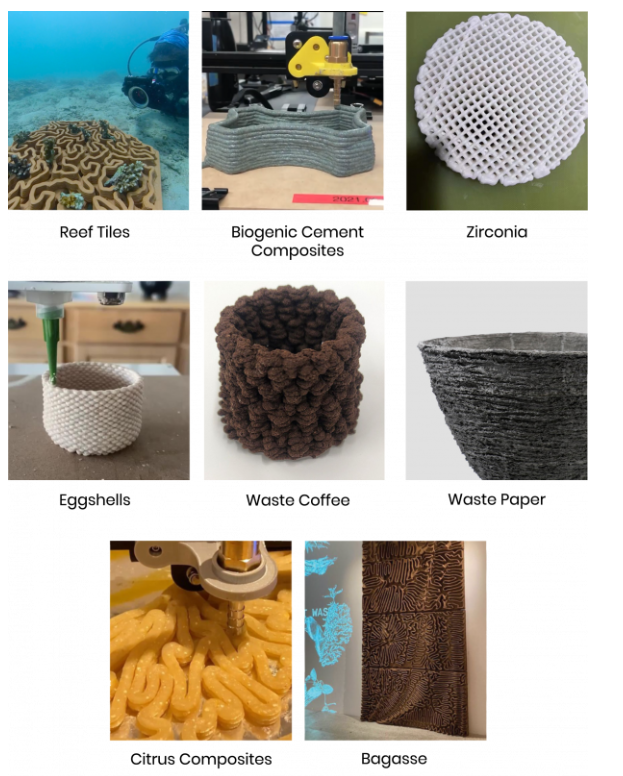Industrial 3D Printing
Materials
Ceramics (newest material used in 3D printing, Binder Jetting Technology, Stereolithography and Digital Light Processing)
Distinct characteristics
- It has high-precision components with a smooth and glossy surface.
- It has also resistance to acid, heat and lye.
- It has a wide range of colour
Disadvantages
- Ceramic requires great amount of temperature to melt.
- It is not suitable for glazing and kilning processes.
- Since it is fragile, it has limitations in printing objects with enclosed and interlocking parts.
- It is not ideal for piece assembly process.

ABS (Acrylonitrile butadiene styrene )
Distinct Characteristics
- It is one of the most accessible and cheap materials for 3D printing.
- ABS is highly available and has a wide variety of colours.
- This material has a longer lifespan compared to Nylon.
- It is also mechanically strong.
- This material is not suitable for hobbyists. It is only used for manufacturers and engineers who are looking for high-quality prototype production.
Disadvantages
- It requires heated bed when printing.
- Since ABS materials have high melting point, it has a tendency to experience warping if cooled while printing.
- This type of filament is a non-biodegradable toxic material that releases toxic fumes with awful smell at high temperature.
Polyamide/Nylon
Distinct Characteristics
- Nylon is known for its durability.
- It has an excellent strength to flexibility ratio.
- Nylon has a very little warpage.
- This type of material can be easily dyed or coloured.
Disadvantages
- Since nylon is hydroscopic, it should be kept dry.
- It has a shelf life of 12 months.
- This material can shrink during cooling, thus, prints may be less precise.
- Printer suitability also varies.
PLA (Polylactic Acid) = Green Plastic
Distinct characteristics
- PLA is easy to print since it has low warping.
- It can also be printed on a cold surface.
- It can print with sharper corners and features compared to ABS material.
- This material is available in different colours.
Disadvantages
- PLA materials are not very sturdy and can deform when exposed to extreme heat.
- This type of material is less sturdy.
Other materials:
- ASA (acrylonitrile styrene acrylate)
- PETG (polyethylene terephthalate glycol-modified)
- HIPS (High Impact Polystyrene)
- Tool Steel
- Aluminium
- Composite Material
- Powders
- PC (Polycarbonate)
- Stainless steel
- Titanium
- Resin
- TPU ( Thermoplastic polyurethane)
Image to 3D Tools
3D Tools
- SketchUp
- Rhino and Grasshopper
Preparing for 3D printing: Preparing for 3D Printing [McNeel Wiki]





Grasshopper Tutorial for Beginners
Grasshopper - algorithmic modeling for Rhino
Grasshopper Docs: Grasshopper - Category of Addons for Grasshopper | Grasshopper Docs
Vase Design (4) Grasshopper Tutorial for Beginners | Vase Design | Rhino - YouTube
Files Download
Vase Parametric Design Grasshopper Rhino Files Download | architutors
Weaverbird Parametric Facade Design Grasshopper Rhino Files Download | architutors
Weaverbird Parametric Lamp Design Grasshopper Rhino Files Download | architutors
Voronoi Lattice Parametric Tower Design Grasshopper Rhino Files Download | architutors
Parametric Floral Pattern Design Grasshopper Rhino Files Download | architutors
Polygon Morphing Parametric Facade Design Grasshopper Rhino Files Download | architutors
Faceted Voronoi Parametric Form Design Grasshopper Rhino Files Download | architutors
Diya Vase Parametric Design Grasshopper Rhino Files Download | architutors
Vase Design Grasshopper Definition Download | architutors
copetedavid.com
RhinoMCP connects Rhino to Claude AI through the Model Context Protocol (MCP), enabling AI-assisted 3D modeling and architectural design.

Inspiration